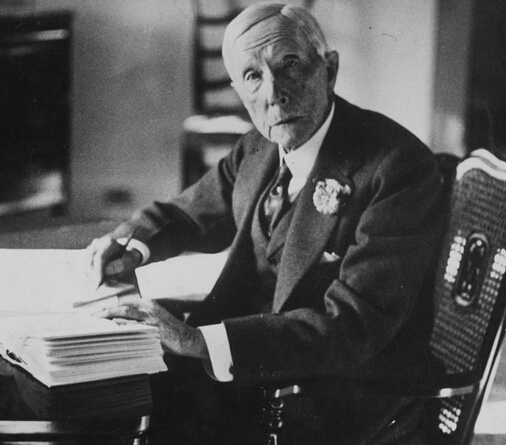
1. John D. Rockefeller

Adjusted wealth*: $253 billion
Lived: 1839-1937
Rockefeller made his fortune by revolutionizing the oil industry. Before his time, lamp oil was unpredictable. But he figured out a way to standardize the quality, and Standard Oil was born.
Rockefeller's shrewd business sense led to the rise of one of the biggest companies in the world. By 1880, Standard controlled 90% of the oil produced in the United States. The government broke it up in 1911 amid allegations of price fixing and other underhanded business dealings, but not before Rockefeller became the country's first billionaire.
He spent the last part of his life giving away much of his fortune, including money to found the University of Chicago and the Rockefeller Foundation. The companies that sprung from Standard Oil's breakup -- including ExxonMobil (XOM), Chevron (CVX), ConocoPhillips (COP) and a big chunk of what are now BP's (BP) U.S. operations -- remain among the world's largest.
2. Cornelius Vanderbilt
Adjusted wealth*: $205 billion
Lived: 1794-1877
Vanderbilt got his start sailing barges across New York Harbor, and gradually expanded into steamships and railroads. One of his favorite business tactics was to undercut the competition so heavily that they would pay him to stay out of a given market.
He was rough around the edges -- swearing, chewing tobacco -- and never really fit in with New York high society.
His heirs did better, building great mansions along New York's Park Avenue and hob-knobbing with the city's elite. But they spent heavily, and by a 1973 family reunion, not one of the 120 Vanderbilt descendants present was a millionaire.
3. John Jacob Astor
Adjusted wealth*: $138 billion
Lived: 1763-1848
Astor got his start as a fur trader after hearing a fellow traveler talk about the profession on his voyage to America. A penniless German immigrant, his business endeavors were helped when he married his wife, who came from a wealthy family.
But his real money came from investing in Manhattan real estate. By the time his son ran the family businesses, the Astors owned over 700 Manhattan properties.
The Astor family fortune was one of the most enduring of the top 20, thanks in part to the elder Astor's insistence that half his trust be set to skip a generation, preventing its squander by spendthrift heirs.
4. Stephen Girard
Adjusted wealth*: $120 billion
Lived: 1750-1831
The French-born Girard started as a cabin boy working the Europe-Caribbean trade route, and became a sea captain by the age of 23. Eventually he owned a fleet of trading ships.
He went on to settle in Philadelphia and used his shipping wealth to become a financier, buying banks and lending money to the U.S. government during the war of 1812. While some of his business practices were thought to have been unscrupulous, he left nearly his entire fortune to charity when he died.
5. Richard Mellon
Adjusted wealth*: $103 billion
Lived: 1858-1933
Richard and brother Andrew (No. 15) were Pittsburgh bankers that had a hand in a variety of burgeoning 19th century industries, including steel, oil, coal and railroads.
In addition to Mellon Bank, the companies they helped found include Gulf Oil and aluminum maker Alcoa (AA).
6. Andrew Carnegie
Adjusted wealth*: $101 billion (tie)
Lived: 1835-1919
Founder of the Carnegie Steel Company, Carnegie is perhaps even more famous for giving his fortune away.
After selling his steel behemoth to J.P. Morgan's U.S. Steel, Carnegie established a number of philanthropic and non-profit organizations including the Carnegie Corporation, the Carnegie Endowment for International Peace, and nearly 3,000 public libraries.
A "man who dies rich dies disgraced," he wrote in Wealth, his most famous essay.
7.Stephen Van Rensselaer
Adjusted wealth*: $101 billion (tie)
Lived: 1764-1839
Van Rensselaer was the last in a line of aristocrats that had been given vast land grants in the New World under Dutch colonial rule. At one point he controlled over a million acres in New York State and had up to 100,000 tenants living on his land. He's the only member on this list to entirely inherit his fortune.
But Van Rensselaer was a progressive at heart, and let much of the rent owed to him slide. He also divided his estate among his 10 children instead of granting it all to his eldest son, which was the custom at the time.
In addition to founding Rensselaer Polytechnic Institute, he also helped finance work on the Erie Canal, commanded 6,000 men during the War of 1812, and was a U.S. Congressman.
8. Alexander Turney Stewart
Adjusted wealth*: $100 billion
Lived: 1803-1876
An Irish-born textile merchant, Stewart went on to run one of the biggest wholesale and retail dry goods businesses in the United States and was a major uniform supplier to the Union Army during the civil war.
His big innovation was to eliminate haggling over retail goods, instead opting for fixed pricing.
9.Frederick Weyerhäuser
Adjusted wealth*: $91.2 billion
Lived: 1834-1914
Timber, lumber and paper magnate Frederick Weyerhäuser and his family were once rumored to control an area the size of Wisconsin.
The Weyerhaeuser (WY) company replanted the trees it cut, and is still considered one of the more responsible forest products firms.
10. Jay Gould
Adjusted wealth*: $78.3 billion
Lived: 1836-1892
Gould was a railroad executive, financier and speculator, and considered one of the most unscrupulous businessmen in U.S. history.
Land grabs, stock watering, bribes -- Gould was accused of it all. He once won control of a railroad company from Vanderbilt by issuing false stock, and then bribing New York regulators to approve the sale.
As a result, he had few friends and was largely shunned by New York society, though he died a rich man.



















